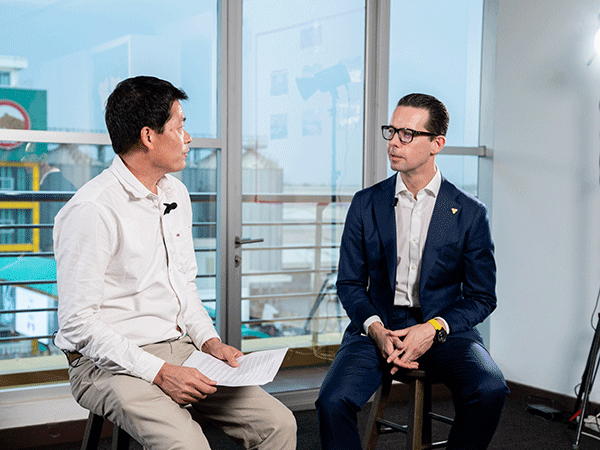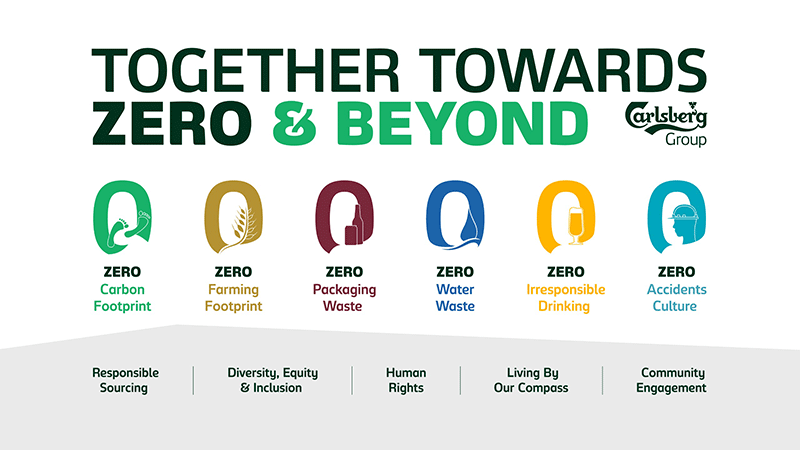Carlsberg CEO highlights sustainability strategy, a core driver of its global growth, during Laos visit
During his recent visit to Laos to mark the launch of a biomass facility supplying green steam energy to the Lao Brewery Company (LBC), Jacob Aarup-Andersen, the CEO of Carlsberg Group - the joint venture partner with the Lao Government for LBC - shared insights into the company’s commitment to sustainability, a core pillar of its global growth strategy, being reinforced in Laos.
 |
Sustainability as a Strategic Growth Driver
Since taking the helm as CEO in September 2023, Mr Aarup-Andersen has prioritised long-term sustainable growth for Carlsberg. His strategy, known as the “Accelerate Sail Strategy”, emphasises investments in high-growth categories such as premium beer and soft drinks, alongside a strong focus on sustainability.
This drive for sustainable development is underpinned by the company’s Together Towards Zero and Beyond programme, which aims to balance Carlsberg’s economic growth with positive social and environmental impact.
“We believe that we cannot deliver long term value for all stakeholders if we don’t deliver long term value to the planet,” Mr Aarup-Andersen said in an exclusive interview with Vientiane Times.
Balancing Profitability and Sustainability
The top executive underscored that sustainability and profitability are not mutually exclusive, and noted that Carlsberg’s initiatives often lead to both environmental benefits and cost savings. A prime example of this in Laos is LBC’s partnership with VN-Green Energy, which has introduced biomass production for renewable energy to power the Vientiane Brewery. This move contributes to a greener environment while improving production efficiency.
“When you look at the investments we’re doing in sustainability and in communities, we are making Laos a greener place,” Mr Aarup-Andersen added.
“It is investments that are also giving long-term economic benefits, so we don’t think that we can make a profitable enterprise long term if we are not a sustainable enterprise. They go hand in hand.”
 |
The CEO highlighted Carlsberg’s commitment to reducing its carbon footprint and promoting sustainable agriculture. The company’s efforts in Laos includes the LBC sustainable and organic rice farming project that now comprises more than 350 hectares of regenerative farming. Being part of a broader strategy to reduce environmental impact, this project supports hundreds of local farmers to grow rice in a sustainable manner by significantly reducing chemical fertiliser usage and improving yields, thereby delivering sustainable and organic rice used to produce Beerlao.
He went on explain that the Together Towards Zero and Beyond initiative encompasses a wide range of goals, from achieving net-zero carbon emissions by 2040 to water conservation, agricultural sustainability, and workplace safety.
In Laos, Carlsberg’s sustainability initiatives have created a ripple effect, benefiting not only the company but also local stakeholders. The biomass plant, for instance, reduces pollution, while the Beerlao Green project supports local farmers through regenerative farming practices. Additionally, as one of Laos’ largest taxpayers, Carlsberg’s investments contribute significantly to the country’s economy.
Local Strength and Global Innovation
Carlsberg differentiates itself from other brewers by combining strong local roots with its global expertise that has been accumulated over the past 178 years. In Laos, Beerlao remains a flagship brand, showcasing the company’s philosophy of integrating local brewing traditions with cutting-edge innovations.
“Our model is very much built around being very strong locally and then using our international brands on top. I think we’re more local than our main competitors,” he said, noting that Carlsberg is the pioneer in beer yeast purification, having developed the first pure yeast strain used in brewing, which revolutionised modern beer production.
Challenges and Future Opportunities
Looking ahead, Mr Aarup-Andersen acknowledged that climate change poses a significant challenge to the brewing industry. Scarcity of key resources such as water, rice, barley and hops require breweries to optimise resource use and support sustainable agriculture.
“We have to be better at also helping farmers create sustainable production and farming. We need to really bring down our water usage when we produce beer,” he said.
Commitment to Responsible Drinking
Beyond environmental sustainability, Carlsberg is committed to promoting responsible drinking, which is a key element of Together Towards Zero and Beyond. In this regard, the company collaborates with local authorities, NGOs and youth organisations to raise awareness to ensure that alcohol consumption remains safe.
“We don’t want consumers to abuse our products. You need to be responsible about consuming our product. It’s important for us that it’s not being misused,” Mr Aarup-Andersen said.
Expansion and Non-Alcoholic Offerings
As Carlsberg continues to invest in Asia, LBC remains at the heart of its regional expansion plans. The company is also exploring growth opportunities in non-alcoholic beverages, including soft drinks and alcohol-free beers.
The CEO said there is quite a strong growth coming now in alcohol-free beer in markets across the world. Although that growth is not coming so far in Laos, “I believe that in the long term, there is a big role for alcohol-free beer, also in Laos,” he said.
Some of Carlsberg’s markets in Western Europe have already seen alcohol-free beer taking up as high as close to 10 percent of the beer market now, he said.
Looking Forward
Carlsberg’s investment in the region, including Laos, is set to continue, with ongoing capacity expansions and sustainability projects. The company is committed to maintaining its leadership in the Lao market while setting new benchmarks for sustainable brewing practices across the region.
About the Lao market, Mr Aarup-Andersen said, “We do expect to see continued growth. We’ve seen strong growth over the last decade.”
With strong local brands, innovative sustainability initiatives and increasing consumer demand, Carlsberg is well-positioned to thrive while making a positive impact on society and the environment.
As Carlsberg strengthens its global presence, its approach in Laos serves as a model for integrating profitability with environmental and social responsibility – demonstrating that a sustainable future and business success go hand in hand.
“We believe in the long term, if you’re not driving a sustainable business that constantly gives back to society, you don’t have a licence to play,” the CEO concluded.
By Advertorial Desk
(Latest Update April 1, 2025)
|



